“I miss his fried potatoes, and his laugh”: five couples separated by Russian captivity
Hearing their partners' voices on the phone, "introducing" a newborn baby to their dad, hugging them and smelling the scent that's unique to them... All these things are a luxury to the wives and partners of the captured defenders of Mariupol, now in the third year of their separation. More than two and a half years have passed since 12 April 2022, the day on which the Russians captured the largest number of soldiers from the 36th Separate Marine Brigade named after Admiral Bilynskyi.
Soldiers from the 501st Separate Marine Battalion, who also took part in the defence of Mariupol, had surrendered and been taken prisoner shortly before that, on 4 April 2022.
Advertisement:Since then, hundreds of soldiers have been held in various parts of Russia and the temporarily occupied territories. For nearly three years now, the Russians have been torturing them, trying them on trumped-up charges, and killing them. Meanwhile the defenders' families have been joining together in NGOs, raising their children, developing their communities and fighting for those in captivity, despite battling despair, fear, and misunderstanding from the rest of society.
Sometimes these women can find solace in letters with declarations of love, poems, or even just an understated message to say "I'm alive and well." However, not all prisoners of war are allowed to write to their families. The wives and partners of five marines talked to Ukrainska Pravda. Zhyttia (Life) about their third year of being apart, what it's like to receive news from captivity, the struggles they face, and what gives them the strength to hold on.
Svitlana Chepeleva
"Leonid wrote to me that even when he thought he wanted to die, some unknown force saved him"
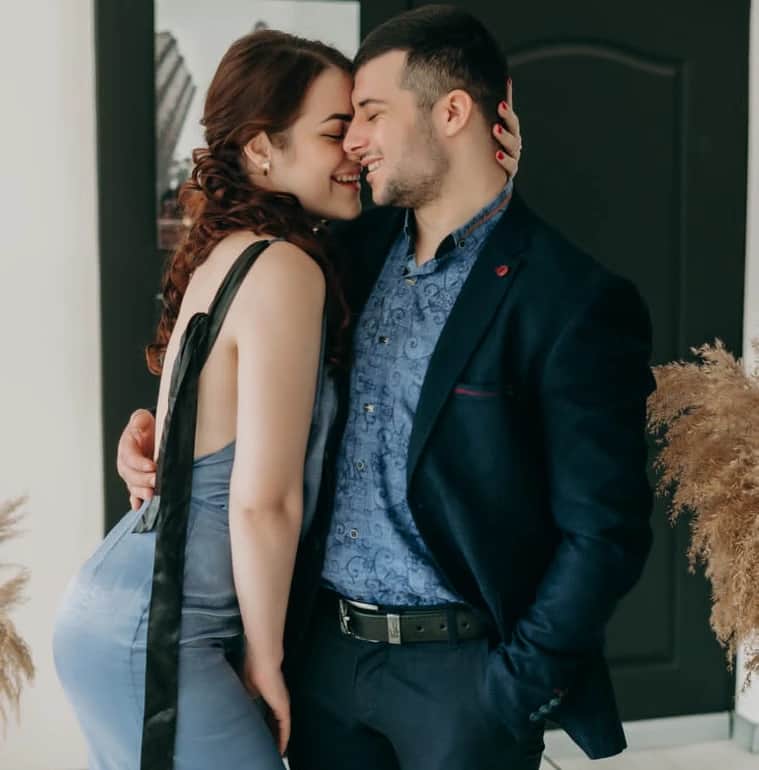 Svitlana and Leonid
Svitlana and Leonid
Svitlana is waiting for her fiance Leonid (Lonia) Bulava to return from captivity.
"For you, my little moon" - this is how Leonid, a marine, signed a portrait of his fiancee Svitlana that he painted in captivity. His drawings and letters are Svitlana's only consolation. She is 28 and has been waiting nearly three years for her beloved to return from captivity.
Family members of the Mariupol defenders who are POWs don't usually receive letters, so Svitlana is relatively lucky. The price of this "privilege" was a show trial and an unlawful sentence. On 11 November 2024, the Russians "sentenced" Leonid Bulava to fifteen and a half years in prison.
He and seven other mortar launchers from the 501st Separate Marine Battalion were accused of "destroying critical infrastructure" in Mariupol and "ill-treating civilians". But more on that later.
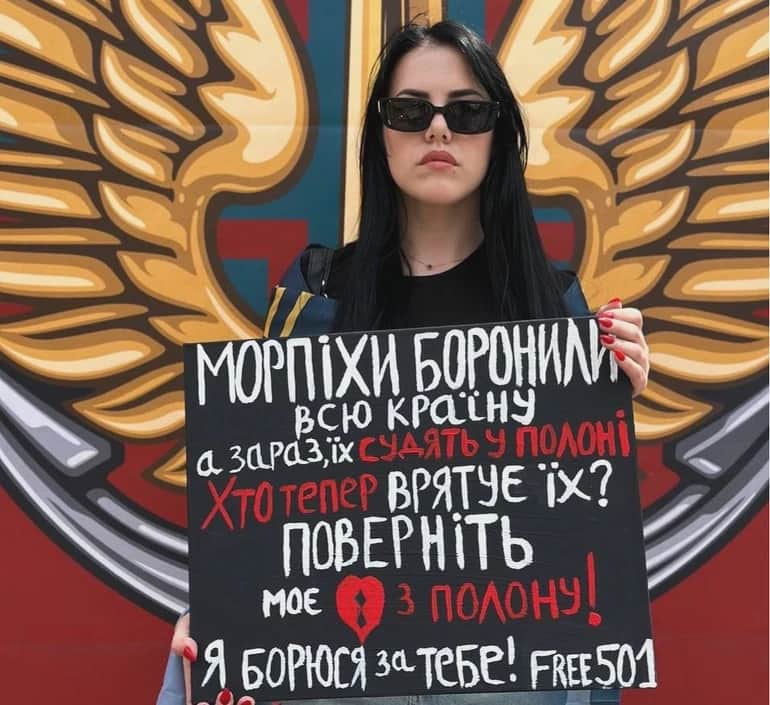 Svitlana at a demonstration to raise awareness of POWs in Russian captivity
Svitlana at a demonstration to raise awareness of POWs in Russian captivity
Svitlana and Leonid met in 2018 and had been together pretty much ever since. Svitlana is from Mariupol, and her boyfriend was stationed in Berdiansk, just over an hour's drive away, so she lived in both cities. [Both are now under Russian occupation - ed.]
"I realised that being in a relationship with a serviceman would mean constant separations, but when you fall in love so deeply, you accept everything," she says. "I felt like he was my rock. In 2021 he proposed, and we planned to get married in 2022. I'd chosen a venue by the sea, the dress...
My mum jokes that I've 'overstayed my welcome' as a fiancee, but I hope we'll fix that soon."
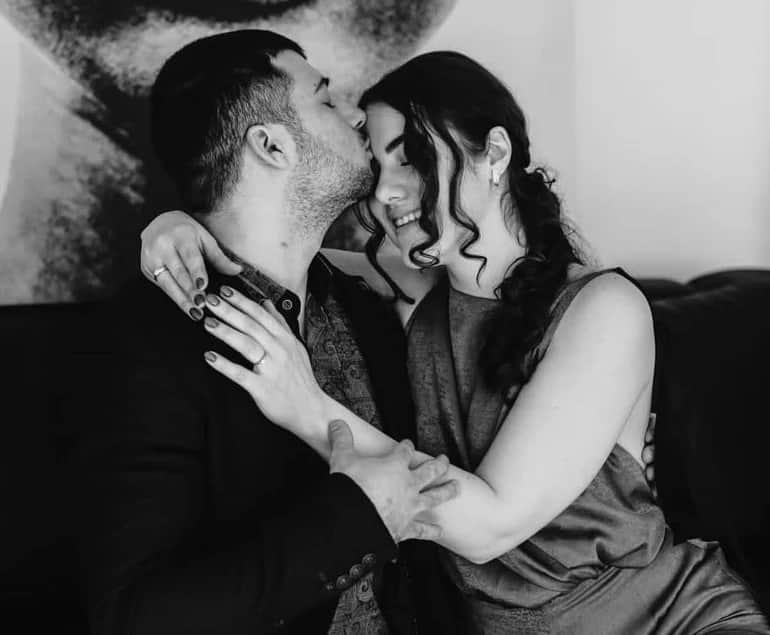 Svitlana and Leonid
Svitlana and Leonid
When Russia started the full-scale war, Leonid was in Shyrokyne, a village near Mariupol, and Svitlana was in Mariupol itself. Leonid immediately told his fiancee to evacuate to a safe place, so she left for Ternopil Oblast in Ukraine's west with her mother and younger brother. Leonid would try to call Svitlana every day for at least a few minutes, but once he lost contact for a week.
Svitlana was terrified and glued to her phone. She had no idea then that the hardest part was yet to come. "When they were at the Illich [iron and steel] plant, he just said: 'I'm alive, everything's fine.' I couldn't ask him anything.
The last time he called me was on 26 March, the day before my birthday. He said: 'I'll call you tomorrow, my love, I'll find a connection, I'll get in somewhere to call you.' But on 27 March, the network along the entire Azov coast went down. I haven't heard his voice since," Svitlana says.
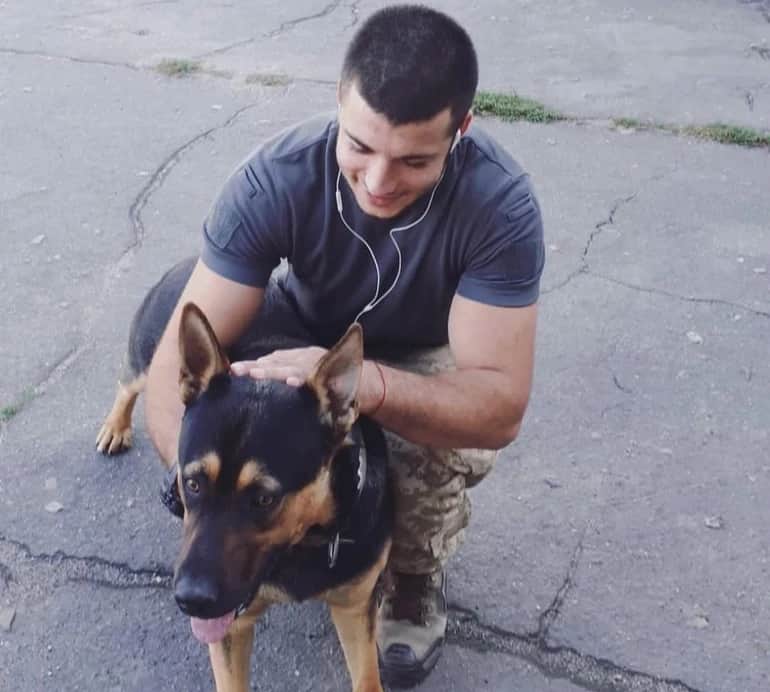 Svitlana hasn't heard Leonid's voice since 26 March 2022
Svitlana hasn't heard Leonid's voice since 26 March 2022
On 4 April, a video appeared on Russian social media showing 267 marines who had been captured from the Illich Iron and Steel Works.
Among the soldiers in the video, Svitlana recognised her fiance. In the first few months after that, Svitlana didn't want to get out of bed. She just cried.
The first time she heard any news of her beloved Leonid was when a man who had spent six months in the same cell as him returned from captivity.
Advertisement:"When this guy called, tears started pouring down my face," says Svitlana. "He told me that they were moved around Russia a lot. In Taganrog, they were constantly interrogated, beaten very badly, dogs were set on them, and they were tortured with stun guns. He also made a joke, 'After all this, we can become electricians.'
But he said my partner was holding on. And I realised that I had to become even stronger."
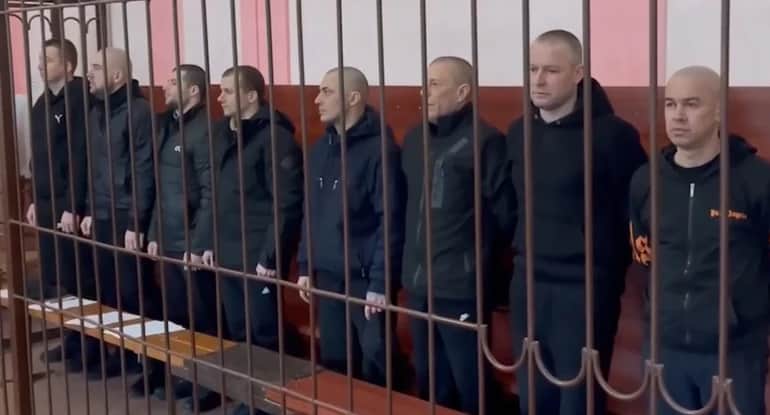 Ukrainian POWs at an illegal Russian trial
Ukrainian POWs at an illegal Russian trial
Svitlana learned from other marines that Leonid had been held in the Olenivka prison camp in the temporarily occupied part of Donetsk Oblast; in Taganrog in Russia's Rostov Oblast; in Bryansk and Vladimir oblasts; and then in the Russian-occupied city of Donetsk. In April 2024, it finally became clear that Leonid was "under investigation", as he was transferred to a pre-trial detention centre in Donetsk.
Although POWs have the right to contact their families under the Geneva Conventions, the Russian Federation only grants this right if they are illegally convicted. Svitlana learned from the mother of another POW that she could correspond with her fiance if she sent him headed paper to write on. "In his letter, Lonia asked if I had changed my mind about getting married.
He also said that he was thinking of 'letting me go' so that I wouldn't waste my youth, but I told him off for thinking that. I constantly remind Lonia that I love him very much and I'll wait for him no matter how long it takes. I collect all the letters he sends me.
We've joked that we're writing a story for our grandchildren and great-grandchildren, so that one day they can read about how their grandma waited for their grandad to come back from captivity. Although when I say this, I still can't take it in that I am that grandma," Svitlana says.
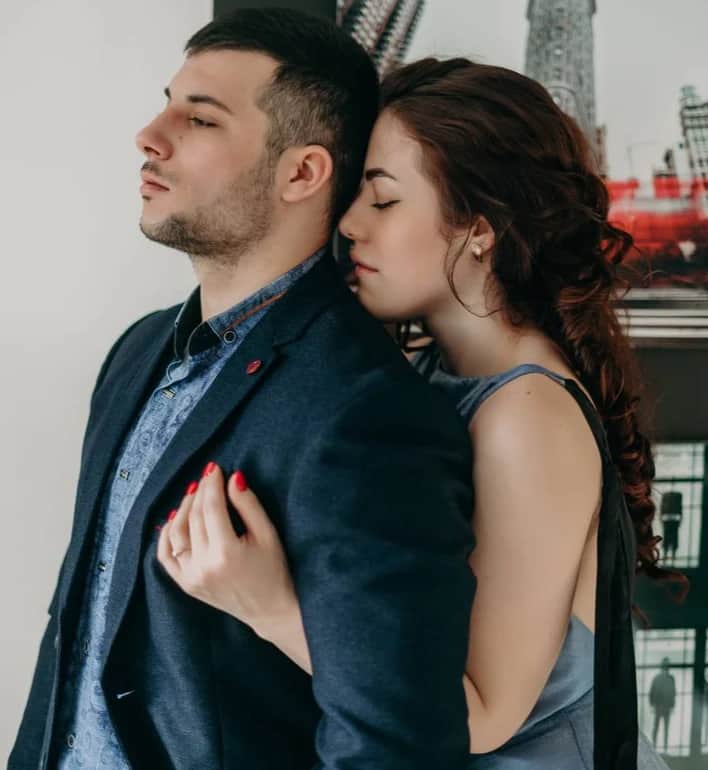 Leonid and Svitlana
Leonid and Svitlana
Since 2022, Svitlana has always kept a bag packed and ready in her hall in case she has to leave quickly to meet Leonid from a prisoner swap. She buys him new clothes every season and looks forward to their reunion.
Leonid has a large family - parents, a brother and sisters - waiting for him at home as well. Svitlana admits that she feels pain after every prisoner swap when her beloved is not on the list. And it's even more painful having to answer dozens of messages from people: "No, he wasn't exchanged."
But despite the rollercoaster of emotions, Svitlana fights against sinking into despair: she's studying for a second degree in psychology, goes to yoga classes to decompress, and attends weekly demonstrations in Chernivtsi, Ternopil and Kyiv to keep the POWs at the forefront of people's minds.
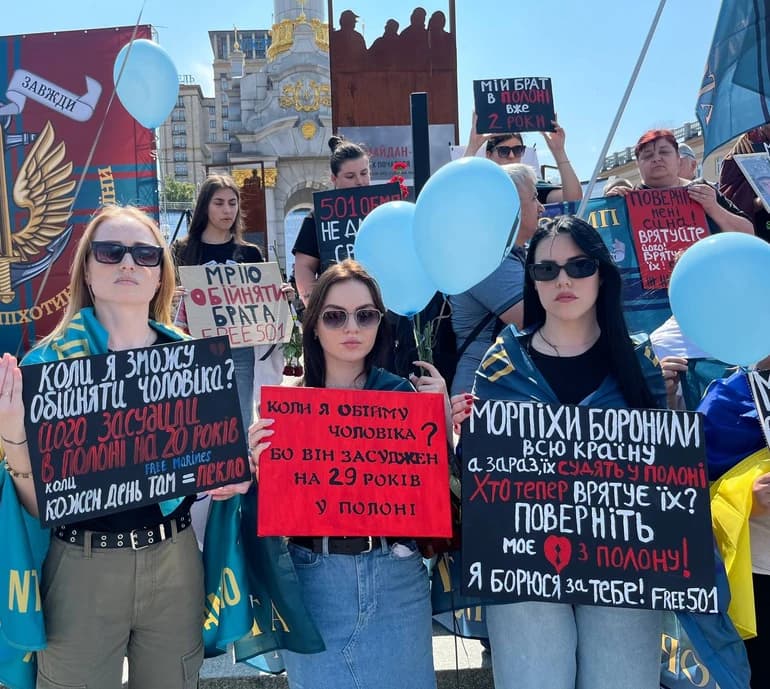 Svitlana at a demonstration to raise awareness of POWs in Russian captivity
Svitlana at a demonstration to raise awareness of POWs in Russian captivity
"The first year I didn't live at all, I just existed," Svitlana says. "But at some point my mum said: 'You need to pull yourself together. It's much worse for him there - you have to fight for him.' And it was like something clicked. I started going to meetings at the Coordination Headquarters [for the Treatment of Prisoners of War] and to demonstrations, and started looking for some information.
Lonia wrote in a letter that he could feel my love and support. Even when he thought he wanted to die, some unknown force saved him. And I realised that I wasn't holding myself together for no reason.
I am sure the guys there can sense that we are fighting for them. When Lonia comes back, I'm going to cry into his shoulder. I imagine hugging him, breathing in his scent and being the happiest person in the world.
But for now, I'm a strong woman."
Anna Bei
"I've learned to hide my tears when I'm with my child"
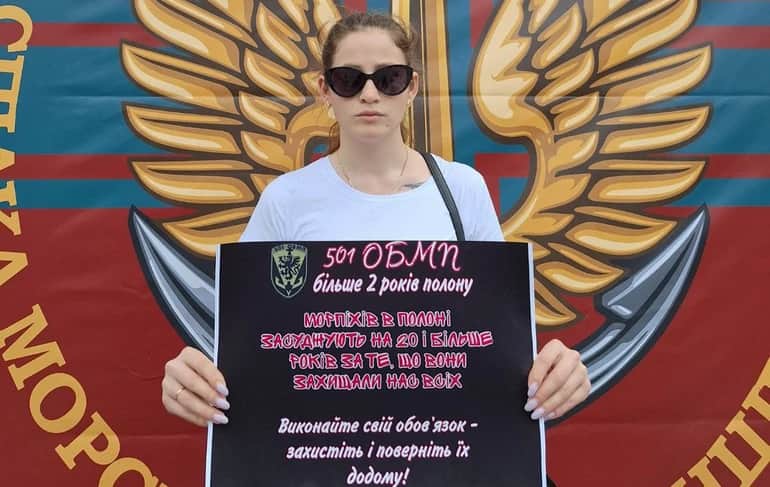 Anna Bei is waiting for her husband, Pavlo, and raising their 8-year-old son on her own
Anna Bei is waiting for her husband, Pavlo, and raising their 8-year-old son on her own
Anna Bei met her husband Pavlo in Zaporizhzhia 10 years ago, when she was 17. And although it wasn't love at first sight, Pavlo's kindness and sense of humour soon won her heart. Now Anna is raising their 8-year-old son, Danylo, alone.
When Danylo started school, Pavlo wasn't there to take him on his first day, because he has been in captivity for over two and a half years. "I've learned to hide my tears when I'm with my child," Anna shares. "When it gets too much, I step outside, have a good cry, then come back. I tell my son that Daddy is definitely going to come home."
Pavlo, a senior sailor from the 501st Separate Battalion of the 36th Marine Brigade, took part in the defence of Mariupol from 24 February to 4 April 2022. For over a month he carried out combat missions in the city, but in early April he was ordered to move to the Illich Iron and Steel Works.
Advertisement:Before losing contact, Pavlo had written to Anna saying he would love to have a second child and that he would definitely return home. Like many other wives of marines, Anna learned that he had been taken prisoner through social media.
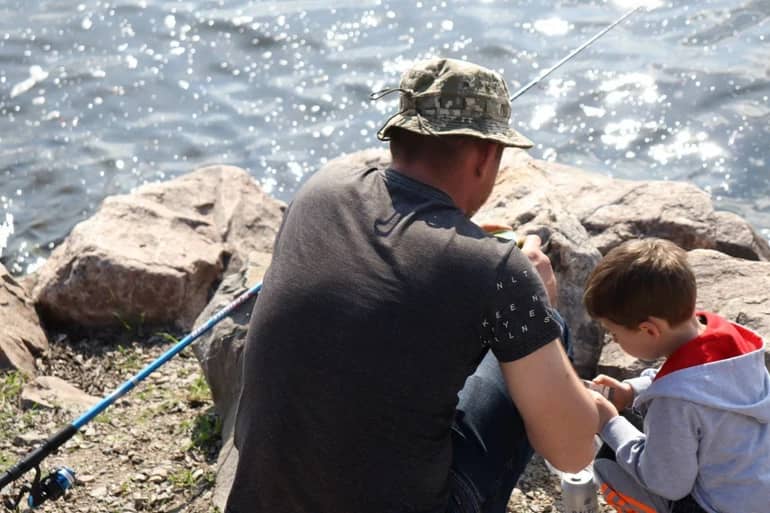 Pavlo told Anna in Mariupol that he wanted to become a dad again.
Pavlo told Anna in Mariupol that he wanted to become a dad again.
Anna agreed, believing it would give him the extra motivation to fight for his life
"I didn't see my husband in any of the videos the Russians posted, and I couldn't understand what was happening. Then I saw a photo of a dead soldier in some Russian group chats who looked very like Pasha," Anna recalls. "I was in a state until the evening, when I realised that the soldier wasn't my Pasha.
So then I just waited." Pavlo's name wasn't listed among the dead or wounded, so Anna held onto the belief that he was alive. This faith, and their young son, helped her to stay strong.
It wasn't until four and a half months later that the International Committee of the Red Cross (ICRC) confirmed that Pavlo was in captivity.
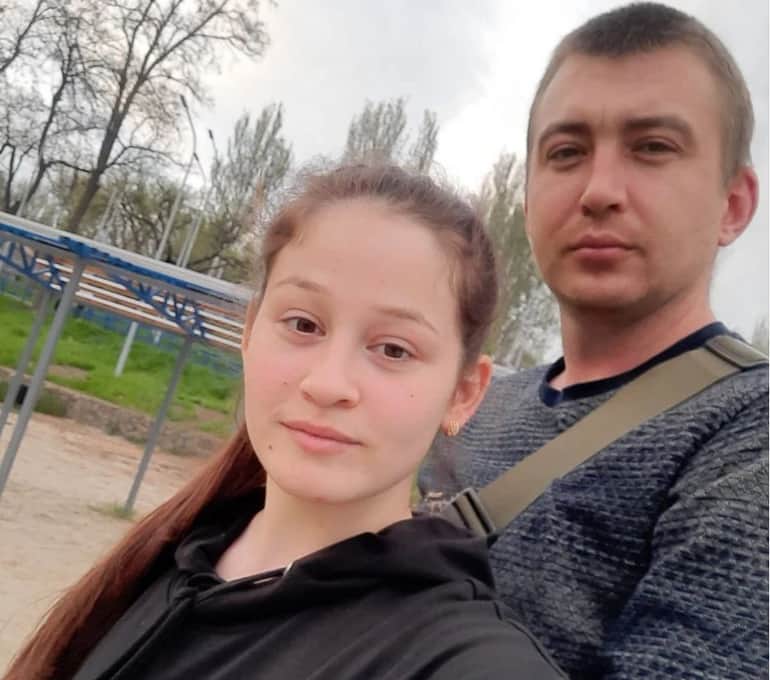 In 2024, Anna learned that her husband had spent some time in a prison camp in Mordovia, Russia, that is known for its brutality and torture
In 2024, Anna learned that her husband had spent some time in a prison camp in Mordovia, Russia, that is known for its brutality and torture
When other marines began returning home, Anna learned of the brutal treatment meted out to prisoners of war in Russia. In the camp where Pavlo was held, prisoners were tortured with electric shocks and forced to stand for 16 hours a day. In January 2023, Anna was informed that her husband had been seen in Russia's Tula Oblast.
Then, in 2024, a man who had shared a cell with Pavlo in Mordovia returned from captivity. Mordovia is notorious for its prison camps, known for their extreme conditions. The bodies of many marines who were tortured in this region have been returned to Ukraine.
"Several people from our 'eight' [a group of Ukrainian POWs - ed.] were held in Mordovia," Anna says. "They were forced to stand for at least 16 hours a day, with only brief moments to sit during meals. But you can imagine what the food was like - my husband weighed 95 kg (210 lb) before he was captured, but by May of this year, he had dropped to around 60 kg (132 lb), despite being 1.88 m (nearly 6 ft 2) tall. My husband was the tallest person in the cell, and his legs suffered the most.
He's slightly better now, but he still has a lot of health issues. His teeth are falling out, he has varicose veins, and he has problems with his right arm. He broke it in September 2022 and it began to rot, but he didn't receive proper medical care."
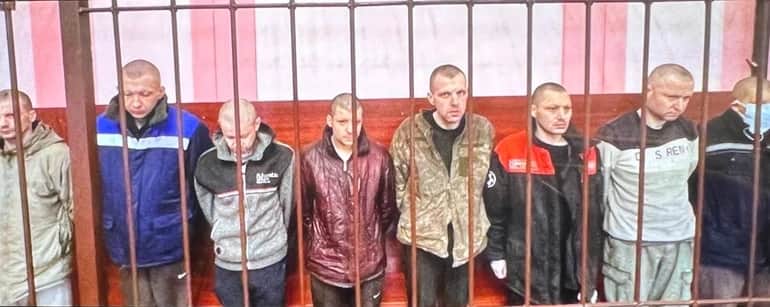 Pavlo (second from left) received an unlawful sentence from the occupying "court" - over 15 years behind bars
Pavlo (second from left) received an unlawful sentence from the occupying "court" - over 15 years behind bars
After forcing a "confession" out of Pavlo, the Russians transferred him to a pre-trial detention centre in Donetsk.
In May 2024, Anna saw him for the first time in two and a half years, in a photo. The man in the photograph, gaunt and worn out, looked far older than his years, but Anna recognised her beloved. It turned out that Pavlo Bei, like Leonid Bulava, is one of the eight mortar men whom Russia is prosecuting on trumped-up charges.
"The charges against them are simply absurd," Anna says. "The Russians forced them to 'confess' to 'cruel treatment of civilians'. I remember a conversation we had in March when my husband called and said, 'We're going house to house, and I'm begging people to leave because the fighting is coming here'." On 11 November 2024, the Donetsk "court" unlawfully sentenced Pavlo to 15 years and 3 months in prison.
The only silver lining of his new "status" was that he could now correspond with his family. "At first he was feeling pessimistic and down," Anna says. "In one of his letters, he suggested we get divorced so I wouldn't have to wait for him. He wrote, 'At least you can live your life.' I burst into tears, and I wrote back that there would be no divorce while he was in captivity.
I would wait for him, and then he could decide. After that, he promised to carry me in his arms when he returned. I sent Pavlo photos of our son so he could see him for the first time in two and a half years.
Our son looks even more like him now."
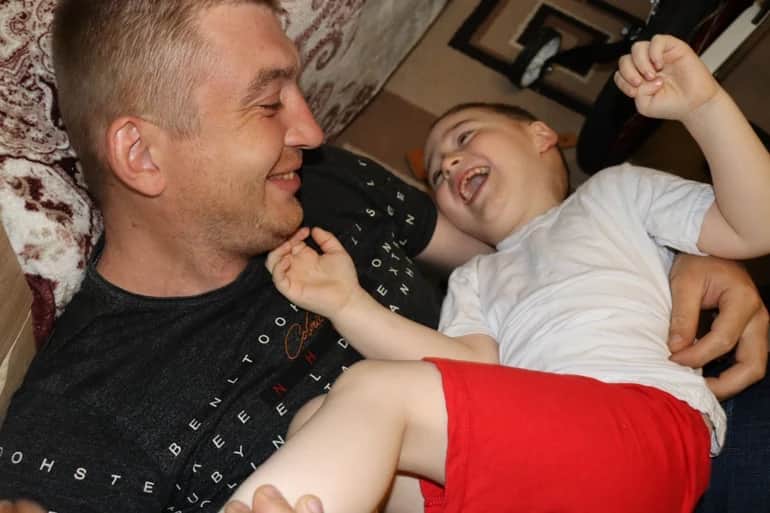 For over a thousand days, Anna's husband has only seen his son in photographs
For over a thousand days, Anna's husband has only seen his son in photographs
Despite the joy of receiving letters, the nearly three-year separation is deeply painful for Anna. Danylo misses his dad too, often imagining how they'll go skateboarding together and build a treehouse. Anna regularly attends events that raise awareness about prisoners of war, and whenever a prisoner swap takes place, she dreams of seeing her husband's name on the list.
"It feels like being on a ship - you're up and down all the time," Anna says. "On the one hand, it's okay because I know my husband is alive, but then the emotions hit, and all I want is for him to be home, right this second. I keep remembering Pavlo's strong arms. When he used to come home, he'd hug me, and I'd feel so small compared to him...
Now Pavlo asks me to buy something for myself, to treat myself, but I don't need anything. I just want to hear him say 'I'm home' and hold him - that's all I wish for."
Viktoriia Sobchuk
Our son told Santa he didn't want any presents - just for his dad to come home
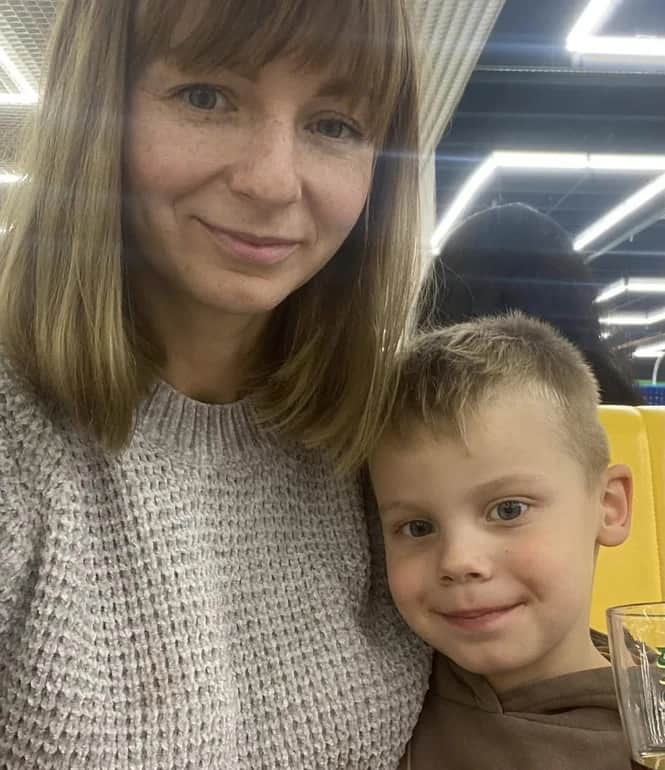 Viktoriia Sobchuk, 32, wife of marine Andrii Sobchuk
Viktoriia Sobchuk, 32, wife of marine Andrii Sobchuk
Viktoriia Sobchuk, the wife of Ukrainian marine Andrii Sobchuk, lives in Mykolaiv with their two children. With their bright blue eyes and warm smiles, six-year-old Mark and two-year-old Marharyta are the spitting image of their dad.
Mark has started school and his baby sister Marharyta is starting to talk. But their daddy, Andrii, hasn't been there to watch them grow - he has been held in Russian captivity for over a thousand days. "Andriiko is so kind, thoughtful and determined.
That's how he won my heart," Viktoriia says, recalling the first time she met her beloved.
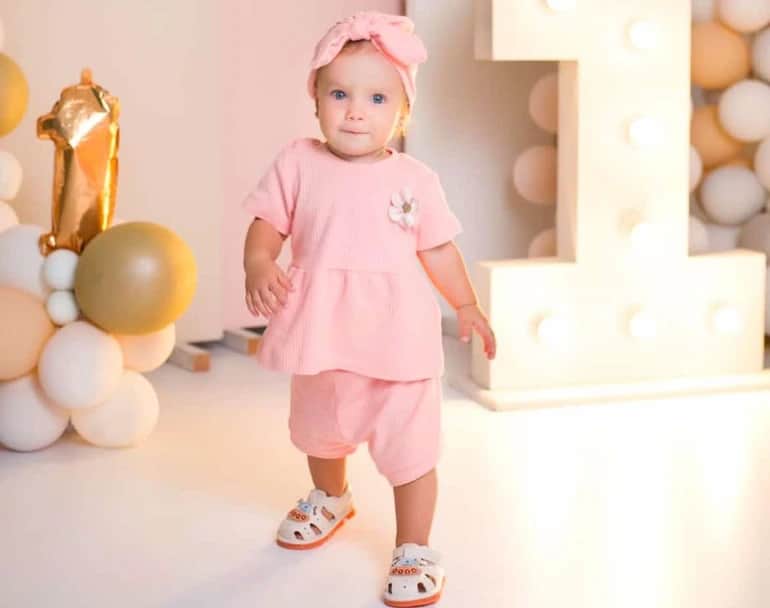 Andrii's son has started school and his daughter is starting to talk, but he hasn't been there to see these precious moments unfold
Andrii's son has started school and his daughter is starting to talk, but he hasn't been there to see these precious moments unfold
Viktoriia, who is from Cherkasy Oblast, and Andrii, from Donetsk, met in Odesa six years ago. Viktoriia was working as a cook at the time, while Andrii served in the Marines. It wasn't long before they tied the knot.
They settled in Mykolaiv and travelled all over southern Ukraine due to Andrii's military service. The couple were living in Mariupol when the full-scale war broke out, but Andrii persuaded his pregnant wife to leave the city with their son. Almost three years have passed since then, and Viktoriia is still waiting to reunite with her beloved.
Advertisement:"I was five months into my pregnancy when he was encircled at the Illich [Iron and Steel Works in Russian-besieged Mariupol in 2022].
I had such an intense nervous breakdown that it's hard to even remember it," Viktoriia recalls. "Andrii could only message me late at night. He told me they were running out of food and ammunition.
The guys had to make do with what they had. I kept reassuring him that help would come, but he had lost hope."
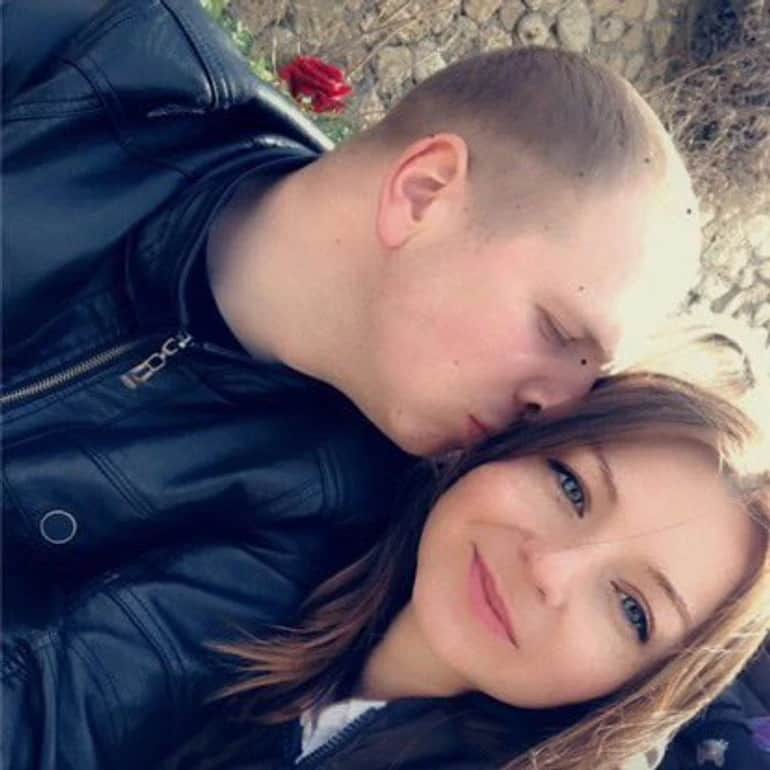 Andrii was deployed to the Illich Iron and Steel Works in Mariupol when Viktoriia was five months pregnant
Andrii was deployed to the Illich Iron and Steel Works in Mariupol when Viktoriia was five months pregnant
As the Ukrainian marines from the 36th Separate Marine Brigade held off the Russian onslaught at the Illich plant, Viktoriia tried her best to lift her husband's spirits, sending him ultrasound photos and making plans for a bright future with him and their children. "We talked about our daughter and argued about her name.
He wanted to name her Marharyta, but I liked the name Anabel. In the end, I decided to name our baby girl Marharyta, just like he wanted," says Viktoriia. One of Andrii's former brother-in-arms once told Viktoriia that her husband would be home in time for the birth.
Sadly, that prediction never came true. Russian forces captured Andrii on 12 April 2022, but for a long time he was considered missing. It wasn't until the summer of 2023 that the International Committee of the Red Cross officially confirmed that he was a prisoner of war.
ICRC representatives helped Andrii exchange some brief messages with his wife, and it was through this that he learned the name of his newborn daughter.
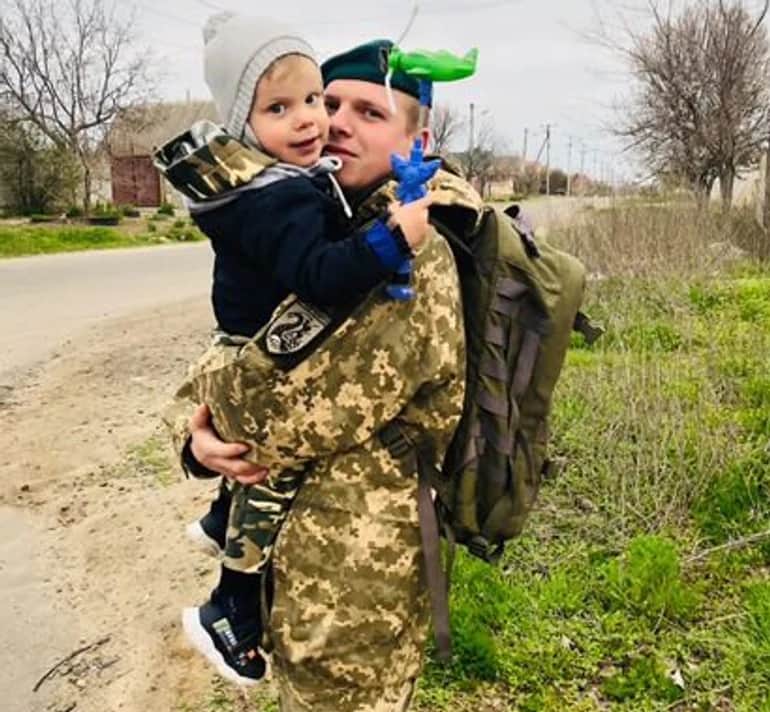 Viktoriia often recalls her husband's sea-blue eyes, their holidays together and the trips they took to the countryside
Viktoriia often recalls her husband's sea-blue eyes, their holidays together and the trips they took to the countryside
Later, some of Andrii's brothers-in-arms from the 36th Brigade told Viktoriia about the torture that the Russians were inflicting on prisoners. She found out that Andrii had been held in Russia - first in Taganrog and later in Pakino, Vladimir Oblast. "The first year was the hardest.
I was on my own with a small child, and I knew nothing. Then I began to convince myself that this was just for a little while, and then he'd be home. I still have panic attacks and breakdowns.
But I try to cry at night, when the children are asleep," she says. Viktoriia thinks constantly of Andrii - his sea-blue eyes, their holidays and the trips to the countryside they shared. Though she no longer receives letters from him, she holds onto the hope that her husband can feel her love, even from afar.
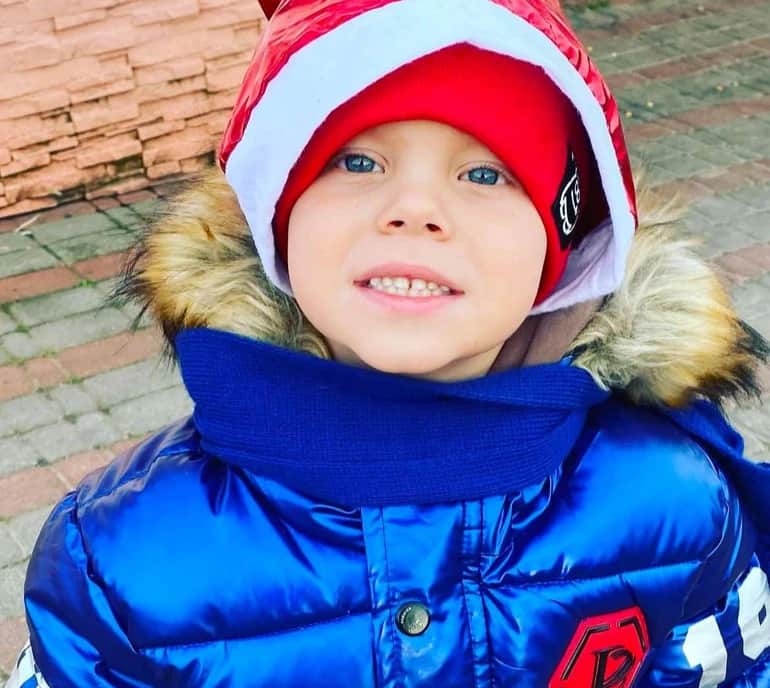 Mark loves looking at photos of his dad and sometimes has dreams about him
Mark loves looking at photos of his dad and sometimes has dreams about him
Viktoriia tells her children how much Andrii loves them and shows them photos of him and videos.
Little Marharyta longs for her daddy, even though she's never met him. Six-year-old Mark is always planning things he wants to do when his dad comes home. "Mark often dreams about Andrii - he dreams they are swimming in the sea and fishing together. Our son misses him so much.
In his letter to Did Moroz [Santa Claus], he even wrote that he didn't want any presents, he just wanted his dad to come home. And I dream of finally seeing my Andrii," Viktoriia adds. "I hope he doesn't think anything terrible and knows we're waiting for him. My love only grows stronger over the years.
I love him so much, and I'm waiting for him."
Violetta Sukhorebrova
"The bandage on his left eye confirmed it was my fiance"
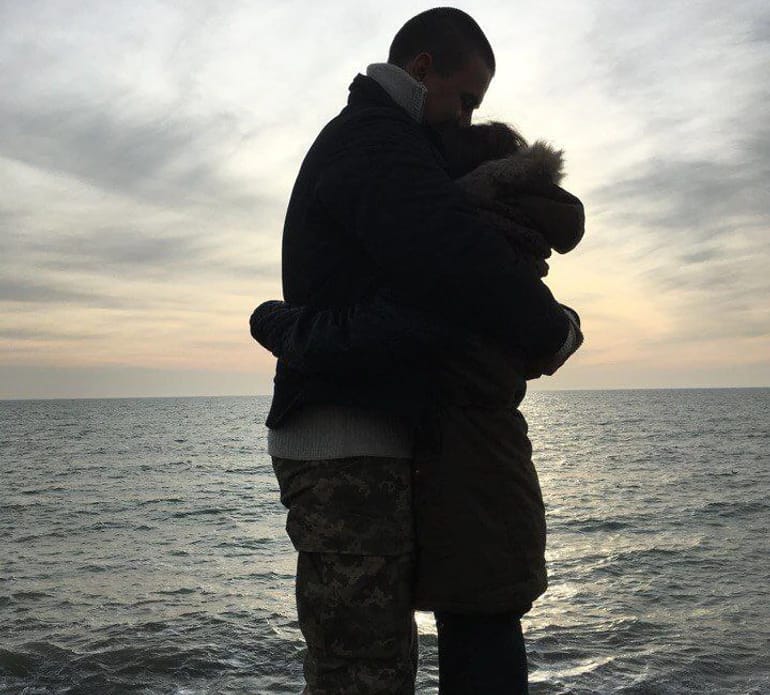 Violetta and Dmytro on their first holiday together
Violetta and Dmytro on their first holiday together
Violetta Sukhorebrova, 24, is a co-founder of the Marine Corps Strength association and the director of Convicted But Not Forgotten, an NGO which brings together families of Ukrainians who have been unlawfully sentenced by Russia. In August 2023, Violetta's fiance, Dmytro Shehai, was sentenced to 22 years in prison on trumped-up charges of "killing civilians" in the city of Mariupol. "Our story began in 2017.
We started talking on social media, though we had seen each other before but never dared to approach one another. He was doing his military service at the time. It wasn't anything overly romantic - we just knew we were good together," Violetta recalls.
In December 2021, Dmytro was sent to Shyrokyne. He hasn't seen his beloved since. A week before Russia's full-scale invasion, Dmytro bought an engagement ring.
He had planned to take ten days' leave in March 2022 to marry Violetta, but the war put an end to their dreams.
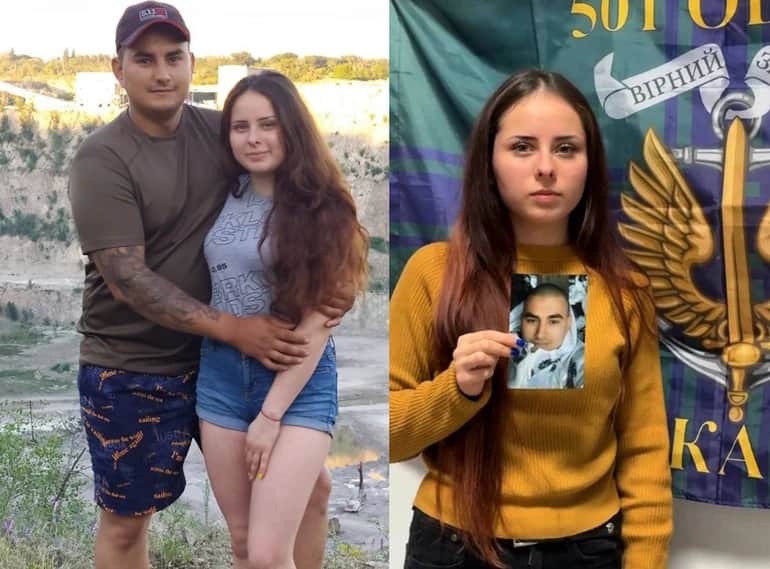 Dmytro lost an eye defending Mariupol and now calls himself a "pirate"
Dmytro lost an eye defending Mariupol and now calls himself a "pirate"
When Russia launched its full-scale invasion, Dmytro was stationed in Shyrokyne and Violetta was in Berdiansk. She evacuated from the city on day one, while Dmytro moved to the outskirts of Mariupol. In late March, Dmytro was transferred to a makeshift hospital at the Illich Iron and Steel Works after sustaining a shrapnel injury to his eye.
On 18 March, he had reassured Violetta during a phone call that he was fine, never mentioning the injury. Only now, in his letters, does he jokingly refer to himself as a "one-eyed pirate". On 12 April 2022, Dmytro was captured by the Russians, along with other soldiers from the 501st Battalion who had remained at the plant.
Violetta hoped he would return home in a few weeks, but he has now been held captive for nearly 33 months.
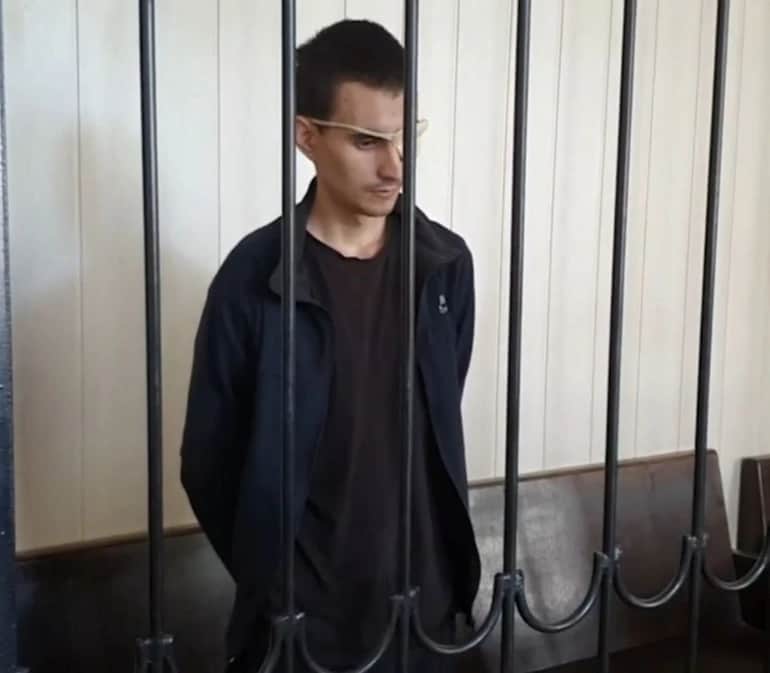 Violetta recognised Dmytro in footage from the "court" by his eyepatch
Violetta recognised Dmytro in footage from the "court" by his eyepatch
"I searched through countless videos and photos, but I couldn't find him," Violetta recounts. "I never stopped looking. After four months, I finally saw him again - but then there was no news for an entire year. I remember the day I found footage of his 'trial' on Russian Telegram channels.
It was a mixture of fear and relief - fear that they might never let him go, but also the joy of knowing he was still alive. At first I didn't recognise him. He was in a terrible state, so thin.
But the eyepatch on his left eye confirmed it was my fiance." In addition to losing an eye, Dmytro developed tuberculosis and hydropneumothorax (a buildup of fluid and air in the pleural cavity due to chest trauma) in captivity. He is currently being held in a medical correctional facility in occupied Donetsk.
Violetta says his health has improved because the prisoners there are treated better than in the prison camps.
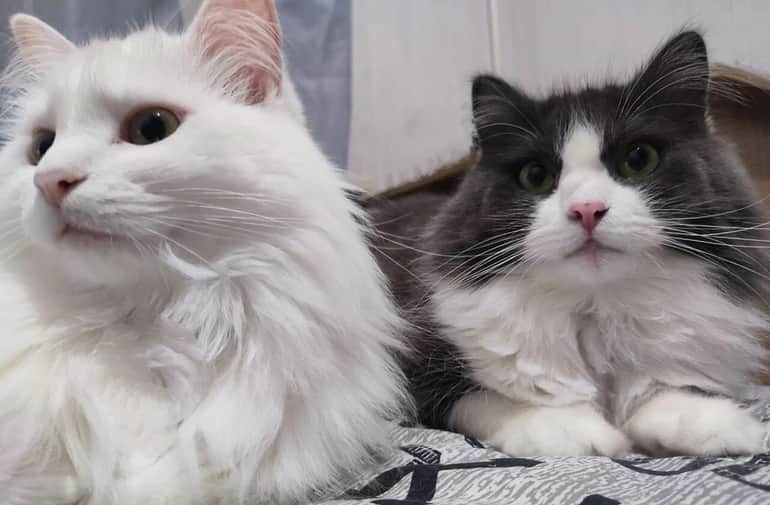 Violetta has been waiting for her fiance for almost 33 months
Violetta has been waiting for her fiance for almost 33 months
Dmytro has managed to send her two letters. In them, he shared that he had carried the engagement ring throughout the defence of Mariupol but lost it along the way. He also said how much he misses their cats, Kitty and Snizhana, who now live with Violetta in Kyiv.
Advertisement:Determined to expedite Dmytro's return, Violetta takes an active part in various initiatives run by Marine Corps Strength, an association which advocates for unlawfully sentenced soldiers.
What gives her strength is writing letters to Dmytro and connecting with others in similar circumstances.
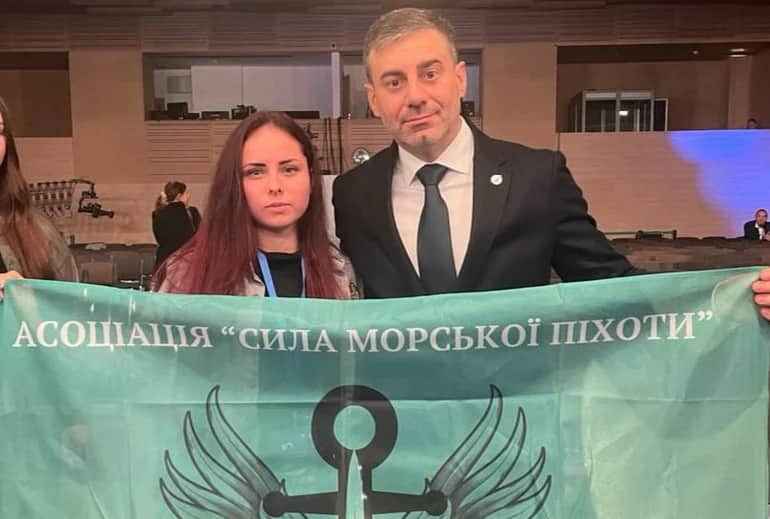 Violetta is a co-founder of the Marine Corps Strength association and the director of the NGO Convicted But Not Forgotten
Violetta is a co-founder of the Marine Corps Strength association and the director of the NGO Convicted But Not Forgotten
"Dmytro and I have been writing about how much we love each other and how we long to be together again. These letters of love and hope are my main source of support," Violetta says. "Being the partner of a prisoner of war is a relentless battle against fear and uncertainty - a constant cycle of checking the news, enduring the pain of separation, waiting for a call or updates from freed captives, searching for information.
But you have to hold onto hope. You have to believe that your loved one will come home."
Yelyzaveta Vanzhula
"I miss his fried potatoes and the way he says 'kitty'"
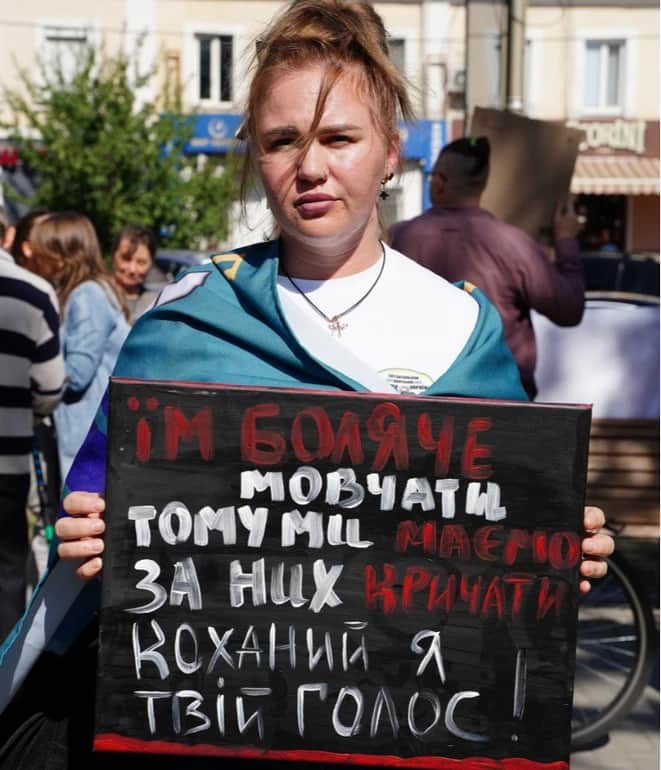 Activist and mother of two Yelyzaveta Vanzhula is waiting for her fiance, Serhii Kucher
Activist and mother of two Yelyzaveta Vanzhula is waiting for her fiance, Serhii Kucher
Yelyzaveta Vanzhula, 30, who lives in Novopetrivka, a village in Mykolaiv Oblast, is the fiancee of sailor Serhii Kucher. The couple met in 2018 when Yelyzaveta was working as an agronomist and Serhii was a combine harvester operator.
It wasn't long before Yelyzaveta's son, Illia, began calling Serhii "dad", and a year later, the couple had a daughter, Varvara. "Serhii is incredibly kind," Yelyzaveta says. "He took great care of the children and they loved spending time with him. He never once raised his voice to them, and he would even gently remind me if I did.
He was always bringing home stray cats and dogs - he wanted to shelter them all." But their peaceful and idyllic life was interrupted by the full-scale war. On 24 February 2022, Serhii voluntarily joined the army and went to defend the city of Mariupol as a member of the 501st Separate Marine Infantry Battalion.
"I tried to dissuade him, but he went anyway. I'm just glad I managed to put warm socks and some sweets into his backpack," Yelyzaveta recalls. "I'd get news about the situation in Mariupol from the TV. All Serhii told me was that he loved me very much, and that as soon as he came back we'd get married officially and have a church wedding.
We were talking about having a third child."
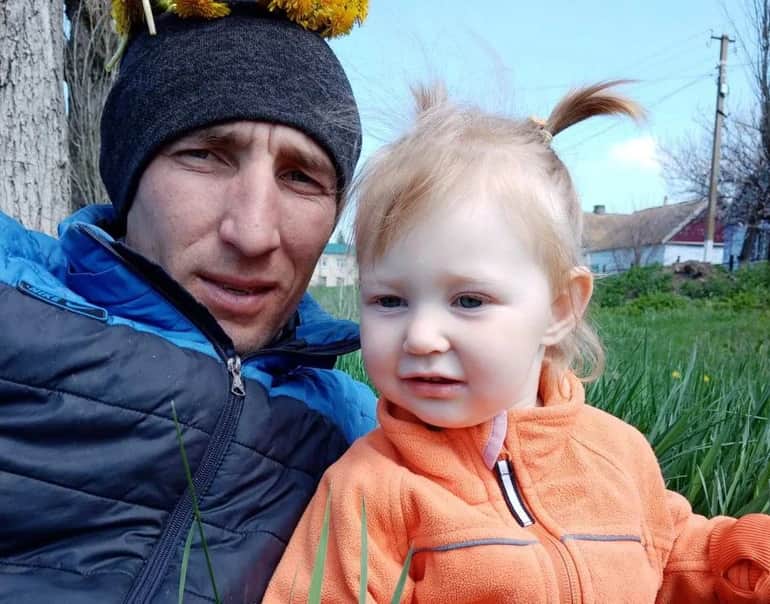 Yelyzaveta and Serhii lived in Novopetrivka, a village in Mykolaiv Oblast which was occupied by the Russians for nine months in 2022
Yelyzaveta and Serhii lived in Novopetrivka, a village in Mykolaiv Oblast which was occupied by the Russians for nine months in 2022
In March 2022, Yelyzaveta found herself living under Russian occupation with her two children and parents. Luckily, she had managed to buy food on 24 February, which saved the whole family for several weeks. There was a constant rumbling and explosions in the village, and military vehicles on the streets.
Yelyzaveta remembers seeing some local men, tied up, being taken away on an armoured vehicle. Yelyzaveta was told by some fellow villagers that the Russians were looking for Ukrainian soldiers' wives and raping them. When she learned that the Russians had found out about her family, she decided to escape.
"Luckily our house was on the outskirts, so they didn't reach us immediately," she says. "I knew we had to flee through gardens and fields, because they knew about us. In a village, someone always lets things slip...
I grabbed the kids and a bag with our documents in - I even put our hamster in my pocket, though sadly we lost him along the way. At first we were hiding in the basements of other people's houses.
The children were freezing cold and crying - it was horrible. Later a relative gave us his car and some petrol. We drove along field roads where there were no checkpoints.
We later found out those roads were mined, but somehow, we made it."
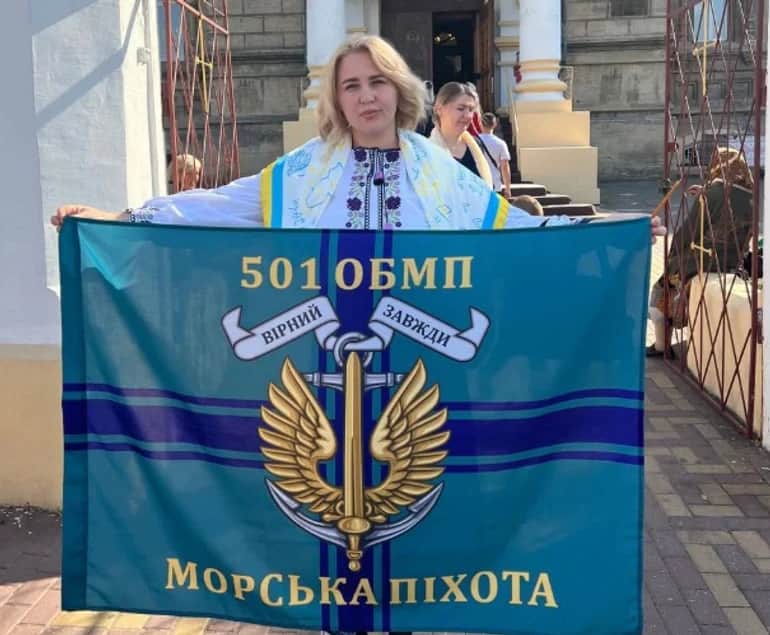 After Novopetrivka was liberated, Yelyzaveta organised a hub to help women affected by the war
After Novopetrivka was liberated, Yelyzaveta organised a hub to help women affected by the war
Shortly after Yelyzaveta had escaped, Serhii was captured. He could no longer contact her, but she recognised him by his hands and passport cover in one of the photos posted by the Russians. There was no news for three months.
Then, in the summer of 2022, Yelyzaveta got a phone call from one of Serhii's former cellmates. "This man had shared a cell with Serhii, and he'd memorised my number. He told me that Serhii was holding strong and often said he was lucky to have me as his wife.
I burst into tears," Yelyzaveta recalls. The next update came on 21 September 2022 after a prisoner swap. Military medic Mariana Mamonova, who had returned to Ukraine from Russian captivity, said she had treated Serhii at a hospital in the Illich Iron and Steel Works in Mariupol.
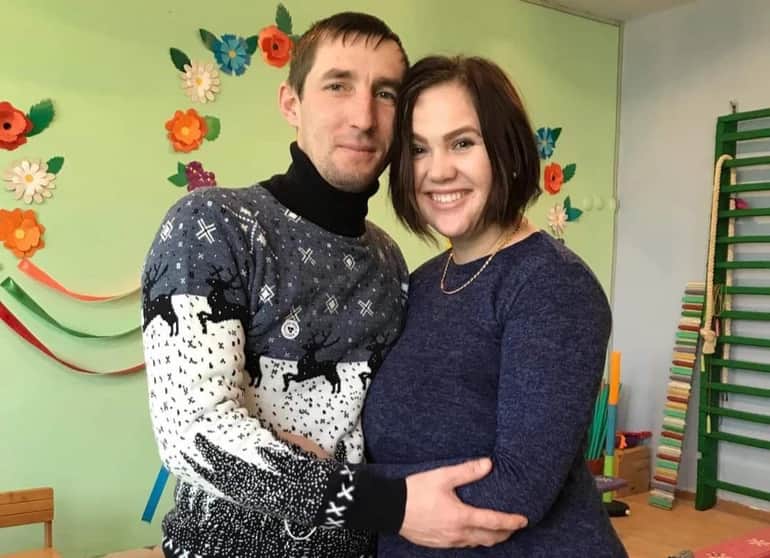 Yelyzaveta first received news from her fiance in 2024 when a letter came from a prison camp in the Republic of Mordovia, Russia
Yelyzaveta first received news from her fiance in 2024 when a letter came from a prison camp in the Republic of Mordovia, Russia
In January 2023, Yelyzaveta learned from another of Serhii's comrades that some of her letters had reached her fiance.
Finally, in 2024, she received a message from Serhii himself - a letter sent from a prison camp in Mordovia. "I wrote to him that we had returned home and that I was rebuilding our house. He said my letters warmed his soul," Yelyzaveta says, holding back tears.
To help other women affected by the war, Yelyzaveta has established a resilience hub called Novopetrivka Woman in her community. With grant funding, she plans to set up a cinema, bookshop, yoga studio, and other spaces where women can spend time together and support one another. After all, Yelyzaveta herself lacks support and care.
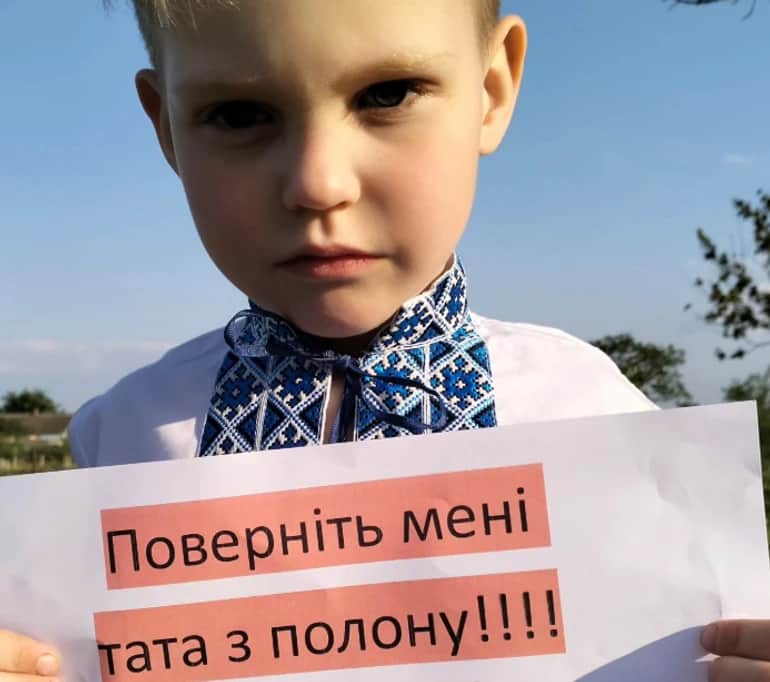 As well as Yelyzaveta, 7-year-old Illia and 5-year-old Varvara are also eagerly waiting for Serhii to come home
As well as Yelyzaveta, 7-year-old Illia and 5-year-old Varvara are also eagerly waiting for Serhii to come home
"Serhii is my love.
I miss his fried potatoes, the way he says 'kitty', his laugh. It makes me sad to think that many families don't appreciate their happiness when their loved ones are around," Yelyzaveta shares. Seven-year-old Illia and five-year-old Varvara are eagerly waiting for their father too.
Both the children and their mother see a psychologist to help them cope with the separation. "Of course I've had breakdowns," Yelyzaveta adds. "I was hospitalised, I got up, I fell down. But I know I can't give up because I have two children.
Now I'm trying to do all the work on the house so that Serhii won't have to do anything. My one dream is his rehabilitation. I've even enrolled in massage courses so that I can help him with that.
After every prisoner swap, I try to be happy for the families who got lucky. And I live in hope that my turn will come soon." Olena Barsukova
Translating: Myroslava Zavadska, Sofiia Kohut, Artem Yakymyshyn, Anastasiia Yankina, Anna Kybukevych
Editing: Teresa Pearce